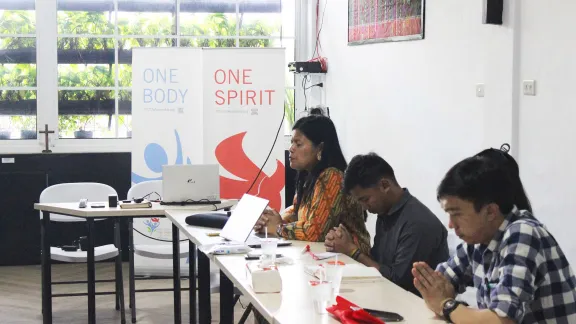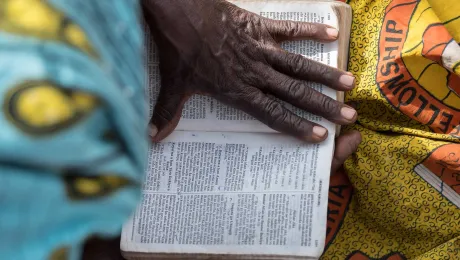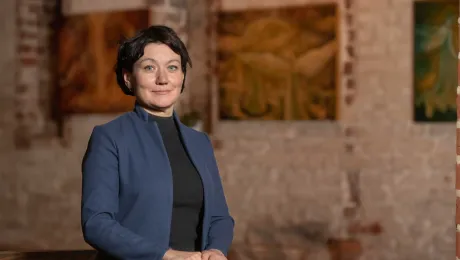
A meeting of the Interfaith Dialogue Academic Community in North Sumatra, Indonesia. Photo: KN-LWF
Indonesian churches collaborate on new training course focusing on religious harmony and interfaith dialogue
(LWI) - Religious diversity and interfaith dialogue is at the heart of an educational initiative that has been pioneered by the Norwegian-based Inclusive Citizenship and Human Rights Project (ICHR) in partnership with the Indonesian National Committee of the Lutheran World Federation (KN-LWF) which brings together 13 local Lutheran churches.
The two organizations have worked together to develop an online course which aims to challenge religious stereotypes, promote a greater understanding and enhance peaceful co-existence between people of different faith communities. The course uses films and other audio-visual tools to showcase ways in which stereotypes and propaganda can be challenged, especially regarding the history, presence and practices of religious minority groups.
Rev. Dedi Pardosi, director of KN-LWF said: "In Indonesia, where religious diversity is a central part of society, interfaith dialogue is not just a theoretical discussion but a necessity for building bridges of understanding and peace. This initiative aligns with the spirit of Interfaith Harmony Week, reminding us that mutual respect and cooperation are essential in responding to the challenges of religious intolerance and social fragmentation.”
We equip church leaders with the skills to engage constructively, challenge misconceptions, and embody a theology of dialogue in their daily lives.
Rev. Dedi Pardosi, Director of KN-LWF
Pardosi explained that through the training course, “we equip church leaders and our regional network of universities and organizations with the skills to engage constructively, challenge misconceptions, and embody a theology of dialogue in their daily lives. As churches in Indonesia, we recognize that dialogue is not about compromise, but about deepening our own faith while learning to appreciate and respect the faith of others."
Dr Ingvill Plesner, Project Manager at the ICHR project of the Norwegian Center for Holocaust and Minority Studies, explained that the partnership with the Indonesian National Committee began in the wake of the COVID-19 pandemic with the production of a short film highlighting religious diversity in Indonesia. “We are delighted that we have been able to collaborate with the LWF at a global level on these important issues, but also at a regional level with the Indonesian National Committee,” Plesner said.
“KN-LWF has a strong regional network of universities and organizations dedicated to promoting interfaith dialogue,” she noted. “Through this network, we had the opportunity to engage with church workers who are active in this field, sparking meaningful discussions about the challenges and the tools that can serve to promote deeper understanding between different communities”.
Focus on Indonesia, Tunisia, Iraq and India
Alongside the grassroots experience of Indonesia, the training course also focuses on religious diversity in Tunisia, Iraq and India, exploring some of the deep historical roots of minorities that have existed peacefully alongside the majority communities for centuries. One module highlights the value of interfaith excursions, visiting places of worship, as well as discovering other ways in which diversity can be expressed through food, clothing, cultural traditions and lived experiences with neighbors and friends.
Another module looks closely at the way stereotypes, based on religious, ethnic, social, national or other differences, can create divisions and hinder integration, often leading to violence and conflict. In an era of growing hate speech on social media, interfaith scholars and practitioners share ways of identifying and breaking down stereotypes through education and practical experiences.
Interfaith dialogue is not about ideas or systems of belief, but it is when people come together to share their deepest held beliefs, values and vision.
Rev. Dr Sivin Kit, LWF Director of Theology, Mission and Justice
Among the interfaith experts who have contributed to the course is LWF’s Director of Theology, Mission and Justice, Rev. Dr Sivin Kit, who shares experiences of growing up in Malaysia, a majority Muslim nation. He emphasizes the importance of “moving beyond preconceived narratives” to ensure that dialogue efforts are grounded in lived experiences. “Interfaith dialogue is not about ideas or systems of belief, but it is when people come together to share their deepest held beliefs, values and vision for their lives,” he says.
Kit also underlines the need for interfaith dialogue to become more inclusive, not limited to “religious leaders or academic experts.” He says: “I believe it’s important for scholars to be engaged, but there is often a gap where women and younger people are not involved.” Very often, he notes, it is women and youth “who bring a special perspective on how interfaith dialogue is practiced in everyday life.”
Young people also bring “the gift of creativity” to interfaith dialogue, Kit insists, because “they are living in a fast-moving world and understand the cost of not understanding and appreciating religious diversity. They challenge us to face our doubts and internal struggles within our religious communities, because they are seeking the relevance of faith to their everyday lives.”
World Interfaith Harmony Week has been marked from 1 to 7 February each year since 2010 when it was introduced by the United Nations. LWF supports the initiative, which provides a platform for interfaith groups and others to showcase their work to strengthen dialogue, mutual understanding, cooperation and harmony between people of different religious communities.


